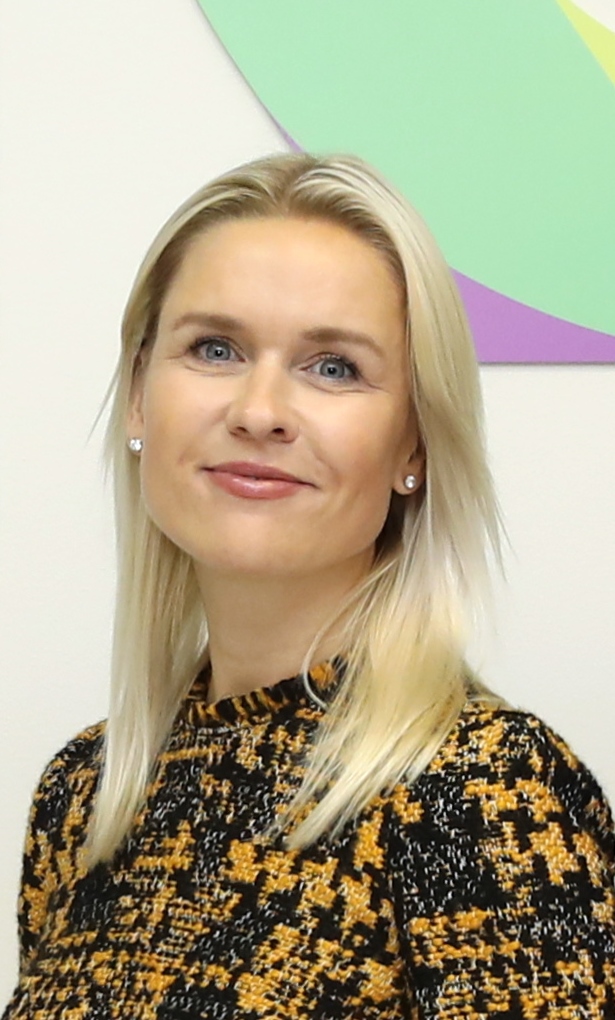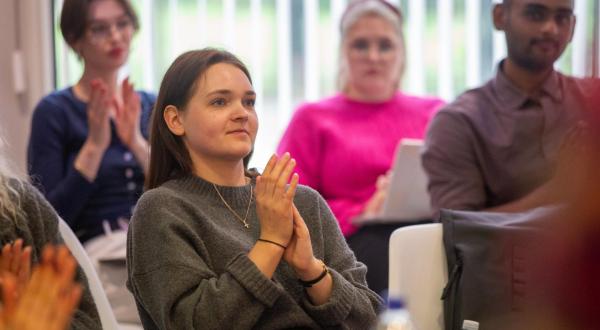Liene Dambiņa: Know what you want when choosing to study health management
Liene Dambiņa (pictured) is a graduate of the Health Management master’s degree programme jointly implemented by Rīga Stradiņš University (RSU) and RISEBA University of Business, Arts and Technology. She has been the Chairperson of the Board of the Children’s Hospital Foundation for twelve years and has during her time there implemented various projects aimed at ensuring that children are provided with the best health care possible.

While Liene managed a non-governmental organisation (NGO) various medical environment and infrastructure projects were carried out, necessary medical equipment was provided, and it was encouraged for medical staff to get further training and much more. We met with Liene during a break in her hectic schedule to ask her what led her to choose the Health Management programme and how she assess what she gained from the programme today.
Was choosing a master’s programme easy?
My motivations for choosing the health management programme were very clear to me. Having worked for the Children’s Hospital Foundation for a longer time, it became clear to me that resources are limited, so it’s important to use them as efficiently as possible in order to be able to help as many children as possible while also contributing to long term development. My time is very limited, so it was important to me to learn specific skills that I would be able to use in my practical day-to-day practical work. And this master’s programme offered precisely that.
Having explored the courses and opportunities, the health management programme gave me confidence that it could be a very valuable addition to the experience I had already gained in health care. There were a number of areas where my knowledge was insufficient, and I knew that additional courses would make my work leading an NGO more productive and efficient.
Which courses do you remember as being particularly useful?
One of the most interesting courses to me was one that covered different health systems, because we encounter them in almost every project at the Children’s Hospital Foundation. If we want to develop in the long term and invest the donations we receive as efficiently as possible, it is important to understand how this system works and what other resources are available. I already understood children’s health care and had my own experience, but I was able to broaden my knowledge of the healthcare system overall. I took a number of other very useful courses as well, such as epidemiology, statistics and others.
The programme offered me a valuable opportunity to do research as part of developing my master’s thesis. My research topic was about premature births: we also implemented a related project at the Children’s Hospital Foundation. The programme included many great things that are still useful to me in implementing projects or cooperating with public authorities.
My fellow students and peers were also a benefit - our paths might not have crossed had we not studied in the same year. Some of my fellow students came from the Emergency Medical Services, the Ministry of Health, the banking sector, some were general practitioners, or representatives from regional hospitals. All of them had already done a lot in their lives, so when they shared their experience, they added a new dimension to the programme.
What do you remember about your lecturers?
All lecturers were very responsive and interested during the course. The same was true when I was working on my thesis. My best memories are about the lecturers approach and attitude. Each group is different, students are different and comes with their own experience, therefore having flexible lecturers is paramount. We could talk about our experience, about topics close to us which may not have been directly included in the study course and they stimulated lively discussions. I would say that the lecturers created a fruitful and flexible learning environment, in which students could learn both from the lecturers as well as from their peers.
What are the main activities of the Children’s Hospital Foundation you manage?
Some of the Foundation’s most important activities are related to the medical field, infrastructure, equipment and various repair work. To do this, we look for partners and raise money. If there is a greater need, we also turn to the public. These are all activities we plan together with the Children’s Hospital and which are implemented after careful evaluation of possible financial sources. The Haemato-oncology Department, for example, is one of the largest projects that we have implemented successfully. It was a joint effort that combined donated and public contributions. Most of the projects are cooperations, and this is, in my view, the best way of implementing them and provides long-term value for investments.
Another line of action is investing in the medical staff’s continuing education, since excellent medical practitioners are the most important resource in health care. We raise funds so that doctors and nurses can continue their education and gain more and more new knowledge and skills. No less important is the task of supporting individual children. There are patients who are recommended treatments that are not covered by the state. We can help in many of the cases and provide support to more than 5,000 children a year.
I should also mention the Adolescent Resource Centre that we have established together with specialists from the Children’s Hospital’s Psychiatry Clinic as a new service for adolescents with mental health problems. We are currently implementing two programmes together with the Ministry of Welfare and the National Health Services, and we are planning to expand our activities, because so far young people of a particular age have not had sufficient mental health support. There is still a lot of work to be done in the field of mental health in general, so we have been actively involved for several years. We also initiated the creation of the first autism room for children with the support of contributors. Now we also cover the costs of treatment for children on the autism spectrum. Parallel we are also keeping the Ministry of Health updated regarding autism, so that state-funded services for these children might be available in the near future.
At the Children’s Hospital Foundation we identify problems and see the holes in health care as we interact with both parents and doctors on a daily basis. Our work starts where these problems intersect.
Looking at other countries’ experience, there will always be a need for supplementary funding whether this is from donors, businesses or other sources that can compensate what cannot be provided through public funding. The extensive and diverse nature of my work shows that the knowledge and skills that I got from the Health Management programme are necessary and useful on a daily basis.
Who makes a good health management student in your opinion?
I do not want to dissuade any young person from coming and studying health management. I would, however, highly recommend my colleagues from the non-governmental sector to study this programme if their work is related to health care.
What advice do you have for future health management students?
It is important to formulate the reasons why you want to study and focus on that. Like the lecturers, students have to be flexible – I encourage you to pay attention to your fellow students and learn from their experiences and their knowledge. I was, for example, delighted to hear how successful my colleagues at the regional hospitals were. You can also get inspiration for ideas that you can later implement in your work.
Related news
 18 Student teams to start developing their ideas in B-Space incubation programmeFor RSU Employees, For Students, Innovation, B-Space
18 Student teams to start developing their ideas in B-Space incubation programmeFor RSU Employees, For Students, Innovation, B-Space


